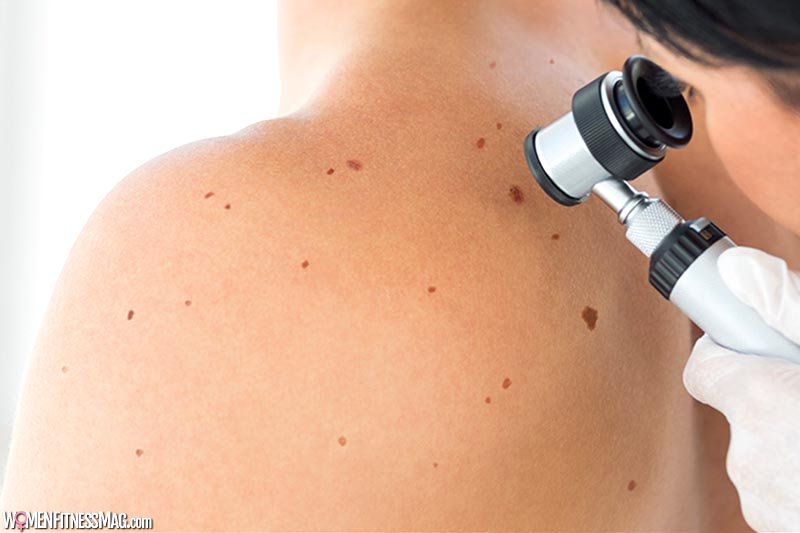Tests and Treatments Associated with Skin Cancer : If you think you have skin cancer, you may go in for some preliminary tests at your home itself. Observe any scars, lesions, etc., that you have noticed on your skin. Please monitor any warts or moles that you may have on your body. Keep an eye on any changes in these structures about the size, colour, shape, etc.
If something appears out of the ordinary, you should consult a doctor at a primary health care centre for a careful inspection of these sores, warts, moles, lesions, etc. If your doctor thinks there is some problem, he will refer you to a dermatologist. A dermatologist is a skin specialist. Your doctor may refer you an oncologist for further examination.
To know more about the symptoms of skin cancer, please click here. If your dermatologist thinks the ‘peculiar spot’ on your skin is harmless, he can remove it by a process called dermatoscopy. He can also remove some mild forms of skin cancer by this process.
On the other hand, if he determines that the spot can be a melanoma, then a more aggressive approach is required. In this case, either of these two advanced tests is conducted.
Biopsy
This process involves removing the entire growth on your skin for examination. Sometimes, your oncologist might also remove the surrounding cells to determine the extent of growth. If there are lymph nodes around, those might be examined too.
In shave biopsy, your doctor will scrape off the top layers of the tumour for examination. Sometimes, he may go in for punch biopsy where the curvature of the tumour is taken off for further study.
Imaging
There are 3 types of imaging tests for managing skin cancer- X-ray, MRI, and CT Scan. These tools are used to check whether the skin cancer has spread to the other parts of the body, a phenomenon also known as metastasis.
Most skin cancers like basal and squamous carcinoma are localized and do not metastasize. However, the more dangerous ones like the Merkel carcinoma and Melanoma are prone to spreading outwards and affecting other body parts.
Now that we have understood the various kinds of skin cancer tests let’s look at some common forms of treatment. Your skin cancer treatment will largely depend upon the size, colour, and location of your scar, wart, mole, tumour, etc. Many skin cancerous tumours are harmless and can be removed by biopsy. In some cases, however, your doctor would take you through advanced treatments.
Radiation therapy
Here, your cancer is subjected to an intense beam of high energy particles like X-ray, photons, etc. These rays kill the cancerous cells and also stop the spread of the disease to the surrounding parts. Radiation therapy is a concise process; each session doesn’t last more than an hour. Radiation therapy is mostly used in cases where surgery is ineffective.
Chemotherapy
In this treatment, you are given particular drugs to kill your skin cancer cells. Some superficial skin cancer types may require a special lotion or cream to be applied on your skin.
Mohs surgery
This procedure is used to treat the larger forms of basal and squamous carcinoma. Mohs surgery is also used to treat recurring forms of cancer. In this surgery, your doctor removes layers of cancerous cells several times until there are no more malignant cells left. Mohs surgery aims to treat skin cancer while conserving as many healthy cells as possible.
Cryotherapy
Here, the doctor freezes the wound created by surgery using liquid nitrogen. Cancer cells are killed using a spoon-shaped blade and an electric needle.
Related Videos about Tests and Treatments Associated with Skin Cancer :
Skin cancers
Mayo Clinic Minute: Raise your skin cancer IQ
Do You Have Skin Cancer?
https://www.youtube.com/watch?v=xC8UNp7UyT4
What causes skin cancer?
What’s that Spot? Skin Cancer Awareness & Screening
Tests and Treatments Associated with Skin Cancer
treatment for skin cancer, skin cancer treatment cream, skin cancer symptoms, types of skin cancer, how is skin cancer diagnosed, skin cancer treatment side effects, skin cancer diagnosis pictures, causes of skin cancer,




